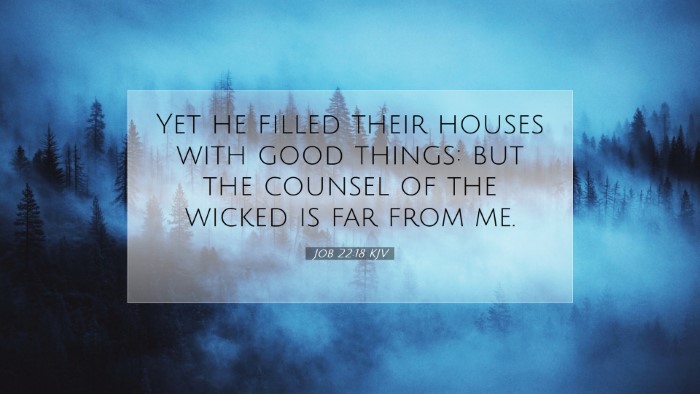Old Testament
Genesis Exodus Leviticus Numbers Deuteronomy Joshua Judges Ruth 1 Samuel 2 Samuel 1 Kings 2 Kings 1 Chronicles 2 Chronicles Ezra Nehemiah Esther Job Psalms Proverbs Ecclesiastes Song of Solomon Isaiah Jeremiah Lamentations Ezekiel Daniel Hosea Joel Amos Obadiah Jonah Micah Nahum Habakkuk Zephaniah Haggai Zechariah MalachiJob 22:18
Job 22:18 KJV
Yet he filled their houses with good things: but the counsel of the wicked is far from me.
Job 22:18 Bible Commentary
Commentary on Job 22:18
Verse Text: "But he said, 'Take away the iniquity, and you will stand in your integrity; you will shine like the dawn.'" (Job 22:18)
Introduction
This verse is nestled within the larger discourse of Job's friends, who provide a series of arguments regarding the nature of God and the consequences of sin. Eliphaz, the speaker here, articulates a belief that the calamities which have befallen Job are a direct result of hidden sin. The complexities of divine justice and the human condition are prominent themes throughout the book of Job, making this verse particularly significant for understanding the righteousness of God and the nature of suffering.
Contextual Analysis
Job 22 marks a pivotal moment in the dialogues, where Eliphaz the Temanite speaks in a confrontational manner against Job, accusing him of wrongdoing. Understanding the context is vital as it sheds light on the theological perspectives that drive Eliphaz’s condemnation.
- Historical Background: Eliphaz is presumed to be speaking from a traditional standpoint. His views reflect the common theological beliefs of the time regarding retribution theology - the assumption that good is rewarded and evil is punished in this life.
- Theological Implications: This verse raises questions about human integrity and divine justice, suggesting that to attain divine favor, one must first rectify their moral failures.
Commentators’ Insights
Matthew Henry's Commentary
Matthew Henry emphasizes the futility of Eliphaz's approach, arguing that while he brings forward truths about divine chastening and the importance of repentance, he fails to apply them correctly to Job's situation. Henry highlights the assumption that Job’s afflictions are the result of personal sin, which undermines the theological exploration of undeserved suffering. He writes:
"Eliphaz's discourse is full of the true maxims of religion; but he misapplies them, and therefore does not deal with Job's case."
Henry elucidates the need for integrity in one’s dealings and the promise of restoration to those who genuinely repent, emphasizing the verse’s central theme of returning to God for redemption.
Albert Barnes' Notes
Albert Barnes gives a thorough explanation of the implications of "take away the iniquity," suggesting that the call is for inward transformation leading to outward restoration. Barnes notes:
"The idea is that there is an antecedent state of guilt which must be removed if one is to hope for God's favor."
He stresses the necessity of purity in heart and conduct, and that Job’s hope for restoration remains contingent upon a sincere turn toward righteousness. This notion resonates with the overarching theme of hope amidst despair found throughout Scripture.
Adam Clarke's Commentary
Adam Clarke provides a critical examination of Eliphaz’s arguments, pointing out that while there may be truth in his statements about God’s nature, his application to Job is misguided. Clarke writes:
"Eliphaz speaks of God as if he were a mere tyrant; but the God of Job is a merciful God, a God that governs by love."
Clarke also delineates the bright imagery of shining like the dawn, viewing this as a symbol of hope and renewal which transcends merely the concept of justice. The dawn signifies a new beginning, an awakening to righteousness that one can experience through repentance and divine grace.
Theological Significance
This verse, when examined through the lenses provided by the commentators, opens up several theological discussions:
- The Nature of Suffering: The assumption that suffering is a direct result of sin is challenged by the broader narrative of Scripture, which details instances of the righteous suffering for reasons beyond their understanding.
- Integrity Before God: The call for integrity reveals the personal nature of one’s relationship with God and highlights that while others may judge us, it is God who ultimately assesses our hearts.
- Hope and Restoration: The imagery of shining like the dawn presents a powerful motif of grace and the promise of renewal that God extends to those who seek Him earnestly.
Practical Applications
For pastors, students, and theologians, Job 22:18 provides vital insights into pastoral care and theological reflections:
- Encouragement in Affliction: In ministry, it is essential to remind those who suffer that their circumstances do not define their standing before God.
- Call to Holiness: The necessity of examining one’s life for hidden sins and striving for integrity is a pivotal reminder for all believers.
- Affirmation of Divine Mercy: Emphasizing the character of God as a loving and merciful redeemer can give hope to the most despondent, reminding them of the dawn that follows the darkest nights.
Conclusion
Job 22:18, while presenting the misguided counsel of Eliphaz, lays bare profound theological truths about sin, integrity, suffering, and the character of God. The insights provided by Matthew Henry, Albert Barnes, and Adam Clarke not only offer a deeper understanding of this verse but also invite believers to engage with the text meaningfully, reflecting on their own lives and the nature of their relationship with God. Through the lens of hope, restoration, and divine grace, this passage remains a powerful reminder of the transformative power of repentance and the unwavering nature of God’s love.


